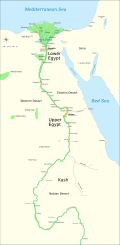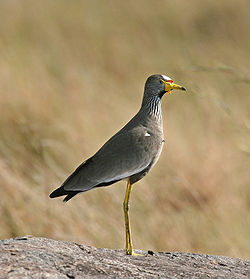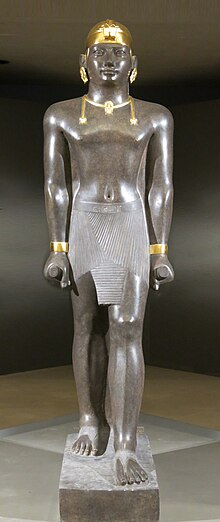Portal:Africa



Africa is the world's second-largest and second-most populous continent after Asia. At about 30.3 million km2 (11.7 million square miles) including adjacent islands, it covers 20% of Earth's land area and 6% of its total surface area. With nearly 1.4 billion people as of 2021, it accounts for about 18% of the world's human population. Africa's population is the youngest among all the continents; the median age in 2012 was 19.7, when the worldwide median age was 30.4. Based on 2024 projections, Africa's population will exceed 3.8 billion people by 2100. Africa is the least wealthy inhabited continent per capita and second-least wealthy by total wealth, ahead of Oceania. Scholars have attributed this to different factors including geography, climate, corruption, colonialism, the Cold War, and neocolonialism. Despite this low concentration of wealth, recent economic expansion and a large and young population make Africa an important economic market in the broader global context, and Africa has a large quantity of natural resources.
Africa is highly biodiverse; it is the continent with the largest number of megafauna species, as it was least affected by the extinction of the Pleistocene megafauna. However, Africa is also heavily affected by a wide range of environmental issues, including desertification, deforestation, water scarcity, and pollution. These entrenched environmental concerns are expected to worsen as climate change impacts Africa. The UN Intergovernmental Panel on Climate Change has identified Africa as the continent most vulnerable to climate change.
The history of Africa is long, complex, and varied, and has often been under-appreciated by the global historical community. In African societies the oral word is revered, and they have generally recorded their history via oral tradition, which has led anthropologists to term them "oral civilisations", contrasted with "literate civilisations" which pride the written word. African culture is rich and diverse both within and between the continent's regions, encompassing art, cuisine, music and dance, religion, and dress.
Africa, particularly Eastern Africa, is widely accepted to be the place of origin of humans and the Hominidae clade, also known as the great apes. The earliest hominids and their ancestors have been dated to around 7 million years ago, and Homo sapiens (modern human) are believed to have originated in Africa 350,000 to 260,000 years ago. In the 4th and 3rd millennia BCE Ancient Egypt, Kerma, Punt, and the Tichitt Tradition emerged in North, East and West Africa, while from 3000 BCE to 500 CE the Bantu expansion swept from modern-day Cameroon through Central, East, and Southern Africa, displacing or absorbing groups such as the Khoisan and Pygmies. Some African empires include Wagadu, Mali, Songhai, Sokoto, Ife, Benin, Asante, the Fatimids, Almoravids, Almohads, Ayyubids, Mamluks, Kongo, Mwene Muji, Luba, Lunda, Kitara, Aksum, Ethiopia, Adal, Ajuran, Kilwa, Sakalava, Imerina, Maravi, Mutapa, Rozvi, Mthwakazi, and Zulu. Despite the predominance of states, many societies were heterarchical and stateless. Slave trades created various diasporas, especially in the Americas. From the late 19th century to early 20th century, driven by the Second Industrial Revolution, most of Africa was rapidly conquered and colonised by European nations, save for Ethiopia and Liberia. European rule had significant impacts on Africa's societies, and colonies were maintained for the purpose of economic exploitation and extraction of natural resources. Most present states emerged from a process of decolonisation following World War II, and established the Organisation of African Unity in 1963, the predecessor to the African Union. The nascent countries decided to keep their colonial borders, with traditional power structures used in governance to varying degrees. (Full article...)
Selected article –
East Africa, also known as Eastern Africa or the East of Africa, is a region at the eastern edge of the African continent, distinguished by its geographical, historical, and cultural landscape. Defined in varying scopes, the region is recognized in the United Nations Statistics Division scheme as encompassing 18 sovereign states and 4 territories. It includes the Horn of Africa to the North and Southeastern Africa to the south. (Full article...)
Featured pictures –
Did you know (auto-generated) -

- ... that during the First World War the East African Mounted Rifles sometimes painted stripes on their horses to camouflage them as zebras?
- ... that the Indianapolis African-American community raised $100,000 in just ten days in 1911 to establish the Senate Avenue YMCA?
- ... that the Enterprise, a black newspaper in Omaha, supported a separate African American department at the 1898 Trans-Mississippi Exposition?
- ... that South African president Jacob Zuma requested a tour of a Sainsbury's supermarket during his state visit to the United Kingdom in 2010?
- ... that activist Gerlin Bean co-founded the Organisation of Women of African and Asian Descent in 1978, an event described as "a watershed in the history of Black women's rights activism"?
- ... that in 1890 Cornelius N. Dorsette, often referred to as the first African-American physician in Alabama, founded Hale Infirmary, a hospital for Black patients and staff in Montgomery?
Categories
Selected biography –
Taharqa, also spelled Taharka or Taharqo, Akkadian: Tar-qu-ú, Hebrew: תִּרְהָקָה, romanized: Tīrhāqā, Manetho's Tarakos, Strabo's Tearco), was a pharaoh of the Twenty-fifth Dynasty of Egypt and qore (king) of the Kingdom of Kush (present day Sudan) from 690 to 664 BC. He was one of the "Black Pharaohs" who ruled over Egypt for nearly a century, or one of the Nubian (or Kushite) Pharaohs of Egypt, since the traditional representation of the 25th dynasty as "Black Pharaohs" has drawn criticism from scholars, specifically because the term suggests that other dynasties did not share similar southern origins. (see Ancient Egyptian race controversy). They also argue that the term ignores the genetic continuum that linked ancient Nubians and Egyptians. (Full article...)
Selected country –
 |
 |
||

| |||
The Gambia, formally the Republic of The Gambia, is a country in West Africa. It is the smallest country on the African continent and is bordered to the north, east, and south by Senegal, and has a small coast on the Atlantic Ocean in the west. Its present boundaries were defined in 1889 by an agreement between the United Kingdom and France.
A variety of ethnic groups live in The Gambia with a minimum of intertribal friction, each preserving its own language and traditions. The Mandinka tribe is the largest, followed by the Fula, Wolof, Jola, and Serahule. Muslims constitute more than 90% of the population. Christians of different denominations account for most of the remainder.
The Gambia has a liberal, market-based economy characterized by traditional subsistence agriculture, a historic reliance on groundnuts (peanuts) for export earnings, a re-export trade built up around its ocean port, low import duties, minimal administrative procedures, a fluctuating exchange rate with no exchange controls, and a significant tourism industry. (Read more...)
Selected city –
Kisumu (/kiːˈsuːmuː/ kee-SOO-moo) is the third-largest city in Kenya located in the Lake Victoria area in the former Nyanza Province. It is the second-largest city after Kampala in the Lake Victoria Basin. The city has a population of slightly over 600,000. The metro region, including Maseno and Ahero, has a population of 1,155,574 people (560,942 males, 594,609 females and 23 intersex) according to the 2019 Kenya Population and Housing Census which was conducted by the Kenya National Bureau of Statistics.
Apart from being an important political city, it is one of the premier industrial and commercial centres in Kenya. It is also an intellectual city with many PhDs. The city is currently undergoing an urban rejuvenation of the downtown and lower town which includes modernizing the lake front, decongesting main streets, and making the streets pedestrian-friendly. (Full article...)
In the news
- 8 April 2025 –
- The death toll from the heavy flooding in Kinshasa, Democratic Republic of the Congo, caused by overflow of the Ndjili River increases to 33 deaths. Hundreds of buildings are completely submerged and thousands of people are trapped in their homes. (NPR) (DW)
- 8 April 2025 – 2024 Democratic Republic of the Congo coup attempt, Democratic Republic of the Congo–United States relations
- Three U.S. citizens are commuted of their crime of attempting a coup against the Congolese President Félix Tshisekedi in 2024 and extradited back to the United States. They were previously sentenced to death along with 34 others for the failed attempt that killed six people, including the coup's leader Christian Malanga. (NPR)
- 7 April 2025 – Herder–farmer conflicts in Nigeria
- The National Emergency Management Agency reports that at least 52 people have been killed and over 2,000 others have been displaced from their homes in recent days in tit for tat attacks by rival herders over control of arable land in Plateau State, Nigeria. (Reuters)
- 7 April 2025 – Algeria–Mali relations
- Algeria bans flights to and from Mali in response to "recurrent violations" of Algerian airspace by Malian military drones. (Reuters)
- 6 April 2025 – Somali Civil War
- At least eight civilians are injured after Al-Shabaab militants launch mortar shells for the second consecutive day targeting Aden Adde International Airport and the heavily fortified Halane compound in Mogadishu. Following the attack, Turkish Airlines and Egyptair cancel scheduled flights. (Garowe Online) (Hiiraan Online) (Garowe Online)
- 6 April 2025 –
- Around thirty people are killed from overnight heavy flooding caused by torrential rains and water overflowing from the banks of the Ndjili River in Kinshasa, Democratic Republic of the Congo. (Al Jazeera)
Updated: 5:05, 9 April 2025
General images -
Africa topics
More did you know –
- ... that Dutch malacologist Adolph Cornelis van Bruggen is an expert in African land snails?
- ... that a 20‑day study reported by BirdLife International discovered 265 species of birds in Nki National Park?
- ... that Kalulu, an African boy who died in 1877, was modeled in Madame Tussauds and attended Dr. Livingstone's funeral in London?
- ... that Samuel Jackman Prescod became the first person of African descent elected to the Parliament of Barbados?
Related portals
Major Religions in Africa
North Africa
West Africa
Central Africa
East Africa
Southern Africa
Associated Wikimedia
The following Wikimedia Foundation sister projects provide more on this subject:
-
Commons
Free media repository -
Wikibooks
Free textbooks and manuals -
Wikidata
Free knowledge base -
Wikinews
Free-content news -
Wikiquote
Collection of quotations -
Wikisource
Free-content library -
Wikispecies
Directory of species -
Wikiversity
Free learning tools -
Wikivoyage
Free travel guide -
Wiktionary
Dictionary and thesaurus



























































































